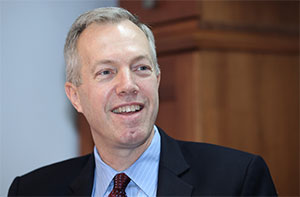US strives to keep interests aligned
 |
| Ted Osius - photo source: vietnamnet |
It is chief among our mutual interests to create sustainable economic growth in Vietnam and the region by expanding trade and investment. There are many strong advocators of the Trans-Pacific Partnership (TPP) because of its potential to promote economic growth here in Vietnam. But even in the absence of TPP, we are not giving up on pursuing our positive trade agenda within the region.
In fact, it is just the opposite. The values embedded in TPP – a rules-based approach to economic relations, higher standards on labour and the environment, and safeguards against corruption – are all consistent with the demands of the Vietnamese people and the economic interests of the US.
During Secretary John Kerry’s recent trip to Vietnam, he reminded us that as a Pacific nation, the US cares about what is happening here, and we want to continue to build a stronger and stronger partnership between our two countries.
Indeed, we are linked to our partners around the Pacific by enduring networks of commerce, diplomacy, communication, and family ties. In Asia-Pacific Economic Cooperation (APEC) particularly, we have a forum to build powerful consensus among these partners to break down barriers to trade by promoting a rules-based regional architecture that supports free and open trade and investment in the Asia-Pacific region, and further strengthen the ties that already bind us together.
Vietnam’s hosting of the 2017 APEC year presents a tremendous opportunity to further the advocacy of American values with Vietnam’s leaders. They know they are in the spotlight, and as Vietnam looks to take on a larger role in regional policy discussions, they will be looking for chances to collaborate with American investors to show the rest of the APEC economies that Vietnam has arrived.
Vietnam has set an ambitious agenda for its host year, and the US fully supports its priorities.
We are determined to increase regional economic integration and foster a more business-friendly environment through a rules-based architecture. We want to ensure that economic growth is sustainable and includes all sectors of society.
In addition, we are committed to strengthening the competitiveness of small- to medium-sized enterprises. The US also shares the goal of guaranteeing the security of Vietnam’s food supply as it faces the consequences of climate change.
We look forward to strengthening our co-operation with AmCham committees in both Hanoi and Ho Chi Minh City to demonstrate the concrete business results of that advocacy. I look forward to working with all of the American business community throughout Vietnam’s APEC year and beyond.
The private sector is going to play a key role in ensuring that Vietnam succeeds with its agenda. I believe that together, we can make 2017 a truly successful year both for Vietnam and for the US business community.
I look at initiatives like the imminent launch of Fulbright University Vietnam. The first private, non-profit, independent American-style Vietnamese University indicates Vietnam’s tremendous desire to learn from the US model of higher education.
I saw the same when Secretary Kerry spoke at the Ho Chi Minh University of Technology and Education, a university founded in 1962 with $3.5 million from USAID, that continues to be one of the best universities for technology education in Vietnam.
The university has formed new partnerships with USAID and AmCham, US universities like ASU, and companies like Intel, GE, Rockwell Automation, and Texas Instruments. This pursuit of excellence also extends to the economic sectors in which the US excels.
With that in mind, the US mission has launched four industry groups in key sectors that focus on helping US companies in keystone industries expand business opportunities in rebuilding Vietnam’s infrastructure.
American companies report to us that they are experiencing double digit growth in the aviation, energy, healthcare, and ICT sectors. Those sectors are all dominated by Vietnamese government actors, and the Consul General and I are committed to advocating on American investors’ behalf in those and other sectors.
What the stars mean:
★ Poor ★ ★ Promising ★★★ Good ★★★★ Very good ★★★★★ Exceptional
Latest News
More News
- NAB Innovation Centre underscores Vietnam’s appeal for tech investment (January 30, 2026 | 11:16)
- Vietnam moves towards market-based fuel management with E10 rollout (January 30, 2026 | 11:10)
- Vietnam startup funding enters a period of capital reset (January 30, 2026 | 11:06)
- Vietnam strengthens public debt management with World Bank and IMF (January 30, 2026 | 11:00)
- PM inspects APEC 2027 project progress in An Giang province (January 29, 2026 | 09:00)
- Vietnam among the world’s top 15 trading nations (January 28, 2026 | 17:12)
- Vietnam accelerates preparations for arbitration centre linked to new financial hub (January 28, 2026 | 17:09)
- Vietnam's IPO market on recovery trajectory (January 28, 2026 | 17:04)
- Digital economy takes centre stage in Vietnam’s new growth model (January 28, 2026 | 11:43)
- EU Council president to visit Vietnam amid partnership upgrade (January 28, 2026 | 11:00)
















 Mobile Version
Mobile Version